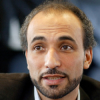Tariq Ramadan

Tariq Ramadan
Tariq Ramadanis a Swiss academic, philosopher and writer. He is the professor of Contemporary Islamic Studies in the Faculty of Oriental Studies at St Antony's College, Oxford and also teaches at the Oxford Faculty of Theology. He is a visiting professor at the Faculty of Islamic Studies, the Université Mundiapolisand several other universities around world. He is also a senior research fellow at Doshisha University. He is the director of the Research Centre of Islamic Legislation and Ethics, based in...
NationalitySwiss
ProfessionWriter
Date of Birth26 August 1962
CountrySwitzerland
Since the uprisings in the Middle East many scholars have come out saying that freedom comes first before the Shariah. There is also something important that we must keep in mind in our understanding the Shariah, and that is the room for what is permissible should be as wide as possible. So we should leave it open to let people be creative.
I am portrayed as a dangerous individual who can be fought thanks to their ideas.
If we agree to say that those terrorists are indeed Muslim, I have no problem whatsoever to condemn their actions. I won't apologise though, or justify my point of view.
We are not competing for the good when we only compete for numbers, being preoccupied with how many converts we are gaining. The true competition for good only happens when we are implementing our values of justice.
In Islam, rules are important, like the Prophet said innal halaala bayyinun, wa innal haraama bayyinun ["what is halal is clear, what is haram is clear"]. The goal is not to diminish the importance of rules, but to have the right priorities.
It's okay to feel the need for protection if there is a real external threat. But to feel protective from the inside, it's a kind of jail: you get so protective that you cannot get out of the box.
Because ethics is fundamentally about questioning the ends, the goals and aims of our actions, we must come back to the rules and ask why. So we must return to the philosophy of law, the raison d'etre and the point of what we're asked to do. It's not easy, it's very demanding and it needs intellectual courage.
There is the philosophy embedded in the culture we are living. It is quite clear for example that Arabs have a different culture than Malaysians.
Greek philosophy departs from the assumption that we can understand the world autonomously using our rational faculties. Islam is not saying this.
Destroying the nation state are mainly three things: the global economy, global communication technology and global culture. And this is where we are lost in the process. What could be something that can provide us a transversal political sense of belonging? At the end of the day, without an alternative we end up with populism in the name of very narrow identities.
We can think of solutions in various theoretical ways, but it's not so on the ground. If they don't have a reference that helps them to belong, then they will end up excluding, and through that they get to feel that they belong on the basis of some narrow identity, language or color.
When I came here [to Malaysia] I heard that there is a problem with the concept of pluralism whereby pluralism is understood in a very narrow way, which I think is wrong. This is not to diminish your sense of truth in what you believe but to acknowledge the fact that we live in a world where we need to deal with pluralism. It's a fact.
Very often we talk about India and China, but not really Malaysia and Indonesia. The potential in the shift to the East is going to be great and very important for this country.
Now no one can deny the fact that whatever is the state of the affairs in the country, you did not have the army controlling the country and you have a pluralistic society anyway.